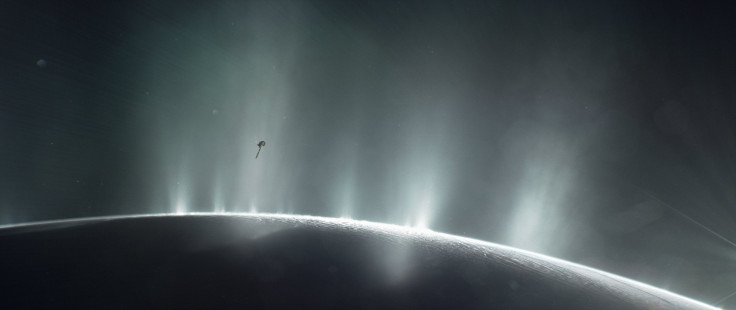NASA New Discoveries: Saturn, Jupiter Moons May Be Able To Support Life

Our best bet for life beyond Earth may not be a planet, but a moon in our own solar system, NASA announced Thursday. The moons, Enceladus (Saturn’s moon) and Europa (Jupiter’s moon), likely have a form of chemical energy that can support life without sunlight, similar to what goes on deep under water on the surface of Earth’s sea floor.
Hydrogen is leaking out of the center of Enceladus, it’s coming from an ocean and leaking through cracks in the icy crust before leaking out into space. If there are any microbes on Enceladus they could draw energy from this hydrogen through a process called methanogenesis that provides the basis of life in some instances.
“This is truly an exciting time for us to be able to probe those and really try to understand what’s happening in these ocean worlds,” said Jim Green, director of the Planetary Science Division for NASA, during Thursday’s conference. Cassini discovered the hydrogen while doing a deep dive through a plume coming off of the moon in 2015, says NASA.
What NASA still has to discover is whether or not the moon also has phosphorus and sulfur, two key ingredients for life, but they suspect it is present because they hypothesize that the core of the moon is similar to meteorites that do contain the two elements, according to NASA.
“It really represents a capstone finding for the mission because we now know that Enceladus has almost all of the ingredients that you would need to support life as we know it on Earth,” said Linda Spilker, Cassini project scientist who works on the Cassini project that made this discovery.
Once scientists made this finding they used thermal imaging via the Hubble Telescope to study Europa. They found that there is a plume coming from the moon’s surface in an area that had shown plumes in the past, NASA specialists speculated that this may mean the same thing is happening on Europa as is happening on Enceladus.
The Europa Clipper is set to launch in the 2020s and will make close flybys to Europa to study the oceans there to determine whether or not the same thing is happening there as on Enceladus, and importantly whether or not the moon could possibly support life.
“If indeed there’s life in there, it has to be completely different than ours in the sense that it generates in a way that’s not related to our life,” said Green.
© Copyright IBTimes 2024. All rights reserved.





















